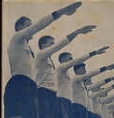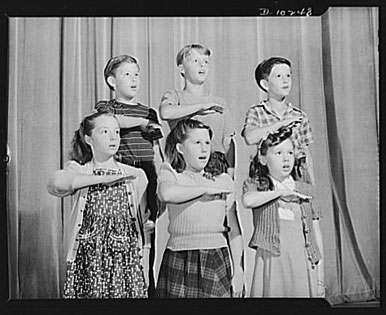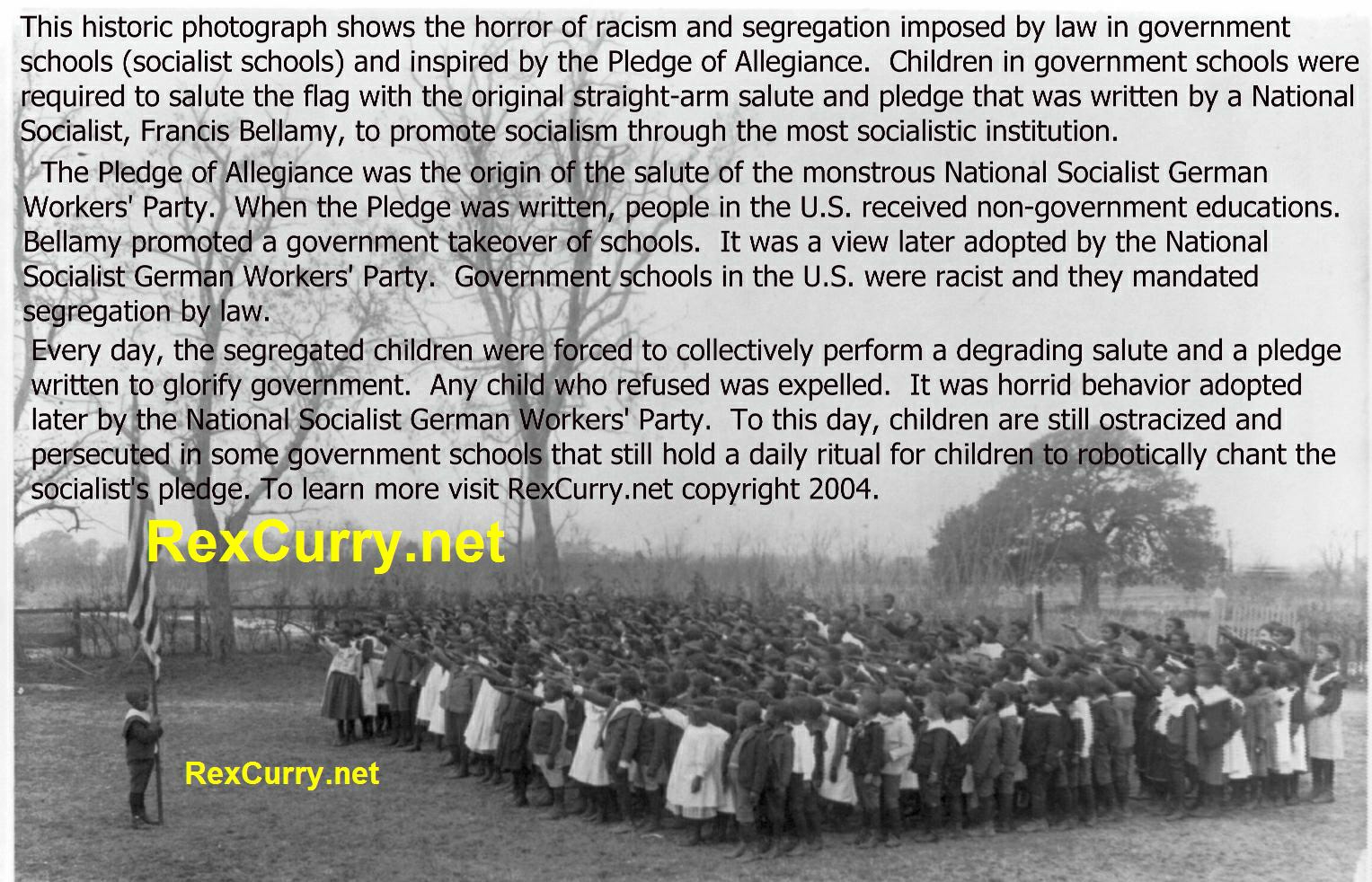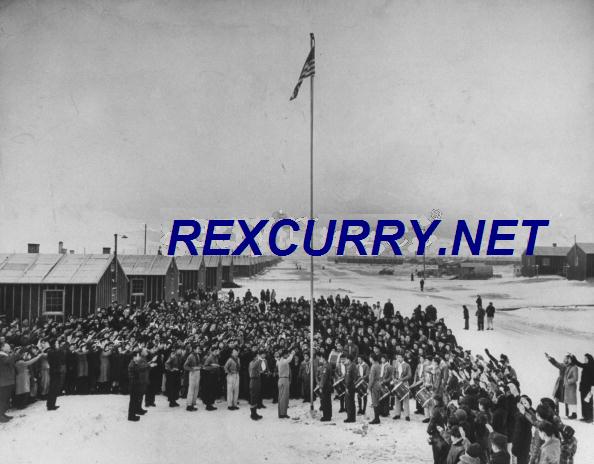Failures of Roosevelt's "Old Socialist Deal" Programs
When President Roosevelt took office in 1933, he feverishly imposed socialist program after socialist program upon Americans. He imposed programs that were called FDR's "alphabet soup" as well as the "New Deal." He exacerbated the government-caused depression (making it "great" in scope and length). Worse, Roosevelt permanently crippled the country and his damage continues to spread. http://rexcurry.net/book11pledge-ch2a1a.html

|
The USA's Pledge of Allegiance (& the military salute)
was the origin of Adolf Hitler's "Nazi" salute under the National
Socialist German Workers Party (Nazis). http://rexcurry.net/pledge2.html The swastika was used by the military and by socialists in the USA and in the USSR, before it was used by the National Socialist German Workers Party (NSDAP). http://rexcurry.net/45th-infantry-division-swastika-sooner-soldiers.html |
The swastika, although an ancient symbol,
was also used to represent "S" letters joined for "socialism" under
the National Socialist German Workers Party (Nazis), similar to the
alphabetical symbolism for the SS Division, the SA, the NSV, and
the VW logo (the letters "V" and "W" joined for "Volkswagen").
http://rexcurry.net/bookchapter4a1a2a1.html |
||
| Francis Bellamy & Edward
Bellamy touted National Socialism and the police state in the USA decades
before their dogma was exported to Germany. They influenced the NSDAP,
its dogma, symbols and rituals. http://rexcurry.net/police-state.html |
||||
THE PLEDGE OF ALLEGIANCE & NAZISM & Franklin Delano Roosevelt (FDR). The straight arm salute was an American greeting before it was a German greeting. Franklin Delano Roosevelt was influenced by Francis Bellamy, Edward Bellamy and their dogma of National Socialism and Military Socialism, years before the existence of the National Socialists German Workers Party. See the video http://www.youtube.com/watch?v=BssWWZ3XEe4
Whenever someone praises Roosevelt's programs, he might as well also praise the programs of Lenin, Stalin, Mao and Hitler. Roosevelt's programs are praised as helping poor people and ameliorating the depression. Wasn't that the same claim made by and for Lenin, Stalin, Mao and Hitler (and the claim was made by the same people who praised FDR)? Did their programs do the same things as Roosevelt's? The only good point is the extent to which Roosevelt and his programs were obstructed and stopped. The sad part is that Roosevelt and his programs were not stopped entirely. http://www.youtube.com/watch?v=mvDwL553pVM
| PROGRAM: | SOCIALIST PROPAGANDA DESCRIPTION: | SOCIALIST PROPAGANDA RE: OUTCOME | TRUE OUTCOME |
| Social Security
Act |
This act established
a system that provided old-age pensions for workers, survivors
benefits for victims of industrial accidents, unemployment
insurance, and aid for defendant mothers and children, the blind
and physically disabled. |
Although the original
SSA did not cover farm and domestic workers, it did
help millions of Americans feel more secure. |
The original SSA
did not originally cover farm and domestic workers. It impoverished
millions of Americans and made them feel less secure. The
unconstitutional theft program continues to impoverish even more
today. It is the cornerstone of the USA's growing police state.
Even American infants are numbered at birth and everyone is tracked
from cradle to grave. http://rexcurry.net/SSNall.html
and http://rexcurry.net/ssnunconstitutional.html |
| Emergency Banking Act/Federal Deposit Insurance Corporation (FDIC) | On March 6, 1933 he shut down
all of the banks in the nation and forced Congress to pass
the Emergency Banking Act which gave the government police state
powers over all banks. Then he created more socialism with the
Federal Deposit Insurance Corporation (FDIC) to force taxpayers to
bail out banks, euphemistically described "insure deposits up to
$5000." |
These measures reestablished American faith in banks. Americans were no longer scared that they would lose all of their savings in a bank failure. Government inspectors found that most banks were healthy, and two-thirds were allowed to open soon after. After reopening, deposits had exceeded withdrawals. | This was more
socialism piled on top of the mess created after the 1913 Federal
Reserve Act was imposed, which expanded the government's ability
to print, counterfeit and inflate its paper money, leading to
more depressions created by the government, including the Great
Depression in 1929. http://rexcurry.net/money.html
These measures lessened American faith in government money.
Government inspectors found that most banks were healthy, but
the socialism stayed, of course. Adding insult to injury, FDR confiscated
every American’s gold. That further expanded the government’s
ability to counterfeit and inflate its worthless paper money.
http://rexcurry.net/moneyart.html
It is sad to note that the USA's police state did not allow private
ownership of gold until 1973. It was illegal for Americans to buy
and own gold American coins, but they could enjoy that freedom by leaving
the U.S. and traveling to Switzerland, though it was illegal for them
to bring those American coins back into the U.S. |
Securities and Exchange Commission (SEC) |
The SEC was created by
section 4 of the Securities Exchange Act of 1934 (now codified
as 15 U.S.C. § 78d and commonly referred to as the 1934 Act).
In addition to the 1934 Act that created it, the SEC enforces the Securities
Act of 1933, the Trust Indenture Act of 1939, the Investment Company
Act of 1940, the Investment Advisers Act of 1940, the Sarbanes-Oxley Act
of 2002 and other statutes. |
The SEC was more socialism
piled on top of various other controls/laws that were imposed. By
its very existence the SEC had an effect upon the public that was similar
to other bureaucracies that claimed to protect the public (compare
social security): it duped the public into believing that it was protected
(in a way that is similar to how social security dupes Americans into
not investing for retirement). Thus the SEC led to the biggest private
ponzi scheme of all time under Madoff in 2008 (the SEC had even looked
at Madoff's work and found no problem). Of course, Madoff's ponzi
scheme was nothing compared to social security. If Madoff had been FDR
then Madoff would have been hailed as a great innovator and statesman.
It is a wonder why Madoff's company was not "bailed out" or declared
to be part of the social security system. |
|
| Civilian Conservation
Corps (CCC) |
This environmental
program put 2.5 million unmarried men to work maintaining and
restoring forests, beaches, and parks. Workers earned only $1
a day but received free board and job training. From 1934 to
1937, this program funded similar programs for 8,500 women. |
The CCC taught
the men and women of America how to live independently,
thus, increasing their self esteem. |
The CCC taught
the men and women of America how to live dependently on the government
in military-style camps, ala Bellamy "military socialism" thus,
decreasing their self esteem. http://rexcurry.net/bookchapter5a1.html |
| Agricultural Adjustment
Act 1934 |
The AAA tried
to raise farm prices. It used proceeds from a new tax
to pay farmers not to raise specific crops and animals. Lower
production would, in turn, increase prices. |
The AAA tried
to raise farm prices. It used proceeds from a new tax
to pay farmers not to raise specific crops and animals. The socialist
reasoning was that lower production would, in turn, increase
prices. |
Socialized American
Agriculture, causing massive problems as it did in similar
programs under the Union of Soviet Sovialist Republics, The
Peoples' Republic of China and under the National Socialist German
Workers Party. http://rexcurry.net/usda.html
Farmers killed off certain animals and crops as they were
told to by the AAA. Many could not believe that the federal government
was condoning such an action when many Americans were starving. Declared
unconstitutional later on. |
| Fair Labor Standards Act
of 1938 |
This purported
to ban child labor and set a minimum wage. In the USA and elsewhere
it can have the effect of turning children into panhandlers, prostitutes
and drug dealers. |
This law was a long awaited
triumph for the progressive-era social reformers. |
A fan writes: I own a business, it's MINE, but along comes
a government and with threat of DEATH tries to FORCE me to pay
someone else a wage that I as the owner am NOT guaranteed. BULLSHIT!
and 3's 8 when the min wage went up I FIRED 4 of my 6 employees,
the remaining two have seen their checks DECREASE. why? because I cut
overtime AND I put them on a 35 hour based salary. How's the work getting
done you ask? I require them to work HARDER, and I have to do more
(which sux). Another way around the law is that Americans simply buy imported
products (that were made by children working for less than the minimum wage
in countries where the police state is not as extensive as in the USA. Some
Americans want those children to lose their jobs too).
|
| Civil Works Administration (CWA) | This public work program gave the unemployed jobs building or repairing roads, parks, airports, etc. | The CWA provided a psychological and physical boost to its 4 million workers. | |
| Indian Reorganization Act of 1934 | This act ended the sale of tribal lands and restored ownership of unallocated lands to Native American groups. | The outcome was obviously positive for the Native Americans. | |
| National Industrial Recovery Act (NIRA) of June 1933 | The decline in the industrial prices in 1930s caused business failures and unemployment. The NIRA was formed in order to boost the declining prices, helping businesses and workers. The NIRA also allowed trade associations in many industries to write codes regulating wages, working conditions, production, and prices. It also set a minimum wage. | The codes stopped the tailspin of prices for a short time, but soon, when higher wages went into effect, prices rose too. Thus, consumers stopped buying. The continuous cycle of overproduction and underconsumption put businesses back into a slump. Some businesses felt that the codes were too complicated and the NRA was too rigid. Declared unconstitutional later on. | |
| Public Works Association (PWA) | The PWA launched projects such as the Grand Coulee Dam on the Columbia River. | One of the best parts of the NIRA. | |
| Federal Securities Act of May 1993/ Securities and Exchange Commission (SEC) | This act required full disclosure of information on stocks being sold. The SEC regulated the stock market. Congress also gave the Federal Reserve Board the power to regulate the purchase of stock on margin. | Not pleasing for businesses. | The SEC was more
socialism piled on top of various other controls/laws that were
imposed. By its very existence the SEC had an effect upon the public
that was similar to other bureaucracies that claimed to protect the
public (compare social security): it duped the public into believing
that it was protected (in a way that is similar to how social security
dupes Americans into not investing for retirement). Thus the SEC led
to the biggest private ponzi scheme (now known as a "Madoff scheme)
of all time under Madoff in 2008 (the SEC had even looked at Madoff's work
and found no problem). Of course, Madoff's ponzi scheme was nothing
compared to social security. If Madoff had been FDR then Madoff would
have been hailed as a great innovator and statesman. It is a wonder
why Madoff's company was not "bailed out" or declared to be part of
the social security system. |
| Home Owners Loan Corporation (HOLC) / Agriculture Adjustment Administration (AAA) | In order to help people keep their houses, the HOLC refinanced mortgages of middle-income home owners. The AAA tried to raise farm prices. It used proceeds from a new tax to pay farmers not to raise specific crops and animals. Lower production would, in turn, increase prices. | Farmers killed off certain animals and crops as they were told to by the AAA. Many could not believe that the federal government was condoning such an action when many Americans were starving. Declared unconstitutional later on. | The dogma behind
the Home Owners Loan Corporation (HOLC) was the same dogma behind
government laws and programs that tricked Americans into the massive
loans/debt/credit that led to the real estate decline, crash and bankruptcies
of 2006-9. The Agriculture Adjustment Administration (AAA) shares blame for socializing American Agriculture, causing massive problems as it did in similar programs under the Union of Soviet Sovialist Republics, The Peoples' Republic of China and under the National Socialist German Workers Party. http://rexcurry.net/usda.html Farmers killed off certain animals and crops as they were told to by the AAA. Many could not believe that the federal government was condoning such an action when many Americans were starving. Declared unconstitutional later on. |
| Tennessee Valley Authority (TVA) (May 1993) | The TVA helped farmers and created jobs in one of America s least modernized areas. | Reactivating a hydroelectric power plant provided cheap electric power, flood control, and recreational opportunities to the entire Tennessee River valley. | |
| Works Progress Administration (WPA) 1935-1943 | This agency provided work for 8 million Americans. The WPA constructed or repaired schools, hospitals, airfields, etc. | Decreased unemployment. | Massively extended
the period of real unemployment by creating fake government jobs
in a method eerily similar to that (and coinciding with that) which
was happening under notorious socialist systems such as that under the
National Socialist German Workers Party and the Union of Soviet Socialist
Republics. |
| Farm Security Administration (FSA) | The FSA loaned more than $1 billion to farmers and set up camps for migrant workers. | ||
| National Labor Relations Act (Wagner Act) | It legalized practices allowed only unevenly in the past, such as closed shops in which only union members can work and collective bargain. The act also set up the National Labor Relations Board (NLRB) to enforce its provisions | ||
| Federal Emergency Relief Administration (FERA) | Led by Harry Hopkins, a former social worker, this agency sent funds to depleting local relief agencies. Within two hours, $5 million were given out. Mr. Hopkins believed that men should be put to work and not be given charity. His program also funded public work programs. | Revitalized many deteriorating relief programs. | |
| War Production Board |
|
|
|
Office of War Information (OWI) & Bureau of Motion Pictures (BMP) |
Office of War Information (OWI) by executive order in June 1942 in order to seize even more control than FDR had from the half-dozen overlapping propaganda agencies that had operated before the war. Infusing movies with propaganda fell to the OWI’s Bureau of Motion Pictures (BMP). |
||
HOOVER |
HOOVER |
HOOVER |
HOOVER |
Reconstruction Finance Corporation |
Herbert Hoover did this as part of his national socialist program that paved the way for FDR's additional expansion of the USA's growing police state. |
||
Federal Home Loan Bank Act |
Herbert Hoover did this as part of his national socialist program that paved the way for FDR. |
||
52 percent increase in government spending |
Herbert Hoover did this as part of his national socialist program that showed the way for FDR's national socialist scams. |
||
Third-largest budget deficit then in U.S. history |
Herbert Hoover did this as part of his hyper interventionist national socialist program that preceded FDR's national socialist scams. |
||
Hoover Dam |
Another "make-work" project of Herbert Hoover of the type that was copy-catted by FDR. |
Return to the Main Page.



 Franklin Delano Roosevelt is a reminder of the character played by Peter
Sellers in the movie "Dr. Strangelove." Sellers played an eccentric, wheel-chair
bound mand with an uncontrollable mechanical hand that involuntarily makes
nazi salutes and threatens homicide. Dr. Strangelove was a German scientist,
and Presidential advisor.
Franklin Delano Roosevelt is a reminder of the character played by Peter
Sellers in the movie "Dr. Strangelove." Sellers played an eccentric, wheel-chair
bound mand with an uncontrollable mechanical hand that involuntarily makes
nazi salutes and threatens homicide. Dr. Strangelove was a German scientist,
and Presidential advisor. 
